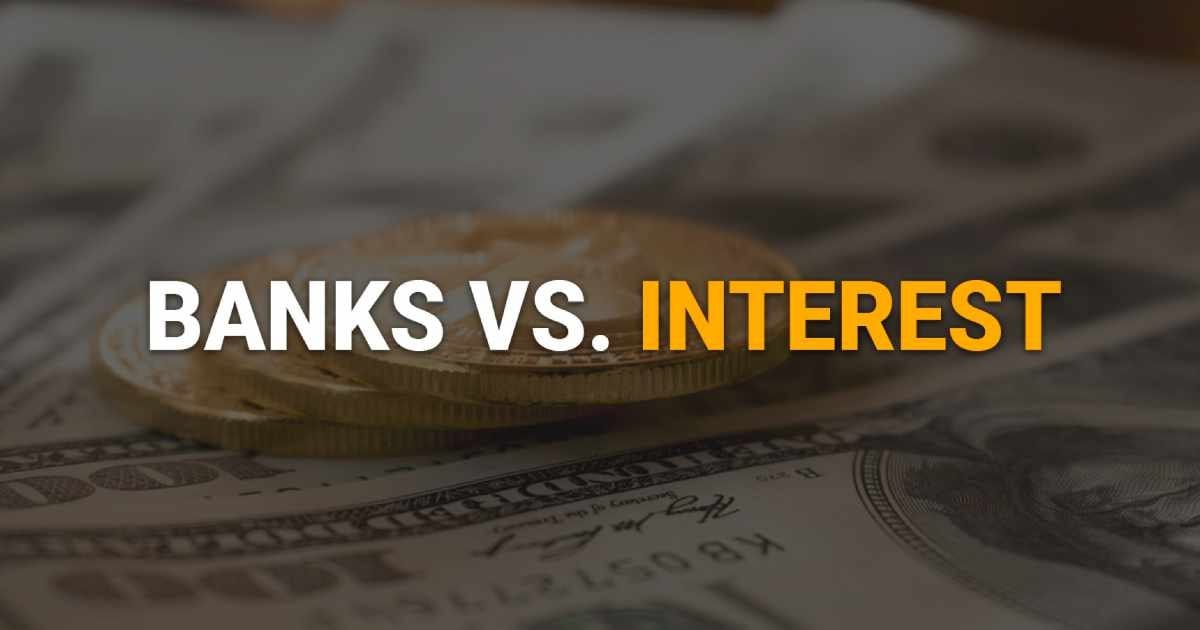
Banks Vs. Interest
Interest rates offered by banks are ridiculously low, and there’s no sign of that changing any time soon. Why do all the major banks seem to agree on giving out such low-interest rates? It wasn’t like this in the past. As recently as 2006, author Trent Hamm of “The Simple Dollar” noted that interest rates of 4-6% were “pretty easy to find.” So what has changed since then? In this article, we’re going to look at a few reasons why most major banks are only offering a mere pittance in interest. We all really need to consider storing our money elsewhere..
Why do banks offer interest at all?
Let’s go over some of the fundamentals at play first. Most of us rely on banks for our financial needs. They keep our cash secure. They allow us to make the electronic payments that we all use, like debit cards, credit cards, etc. Whether they give us interest or not, the average person relies on banking services.

Today, the only reason banks offer interest is to be competitive with other banks in hopes of holding on to your money. That means banks aren’t making profits by simply holding onto your deposits or providing you with a debit card. Instead, they make the majority of their money by lending your funds out to others.
In order to offer loans, banks need to have some amount of money in their vaults. If they don’t have enough deposits in their ledgers, they could miss out on earning high-interest returns on mortgages, car loans, and other loan products.
In an ideal world, banks would offer a reasonable rate of return on checking and savings accounts so they can have enough cash in reserve to make profitable loans. The consumer wins since they get a fair rate, and the bank wins because they have the reserves needed to provide loans.
However, things are unfortunately not that simple.
Tilting the scales in their favor.
Thanks to a concept known as fractional reserve banking, banks are allowed to loan out far more money than they actually have in their vaults. This means that your typical bank has little need for checking and savings deposits since they only require a small amount of funds in banks in order to make much larger loans (and have a bigger payday.) As a result, banks are not incentivized to offer competitive interest rates to attract deposits. Simply put…. they don’t need your money. At least, they don’t need any more money than you are probably already keeping with them. Do note, that fractional reserve banking was actually ended this year too, and the requirement for banks to have 10% is no longer there. Now we have Zero Reserve Banking in play because of the Coronavirus pandemic.
Now, your typical credit card may have an interest rate somewhere between 10% and 29% per year. Mortgage interest rates seem to be hovering between 3% and 6%, and auto loans are typically between 6% and 15%.

For some reason, your typical bank offers far below 1% interest on checking and savings even though their profit margins are typically around 90%. For banks that offer higher than average interest rates, there are often many requirements that must be met to be eligible for better rates. For example, they may need to reach a minimum deposit threshold, or that interest rate only applies to a small amount of their total deposits.
We think a bank that can pull in 20% interest on a loan while giving out less than 1% on deposits funding that same loan is nothing short of exploiting customers. Banks could easily offer 3% APR or more and still be raking in hefty profits year after year. But we give them our money for returns at a fraction of that rate. Why would they ever offer more?
That’s because your typical major bank is a listed public company that is owned in part by the stock market. Generally speaking, companies that are listed on a stock market must act in a way that maximizes profits for their shareholders. If a bank offers 3% interest when they otherwise do not need to, the perception is they are essentially just giving money away. We highly doubt the stockholders would tolerate that.
Changing the equation
Change is inevitable, but how much things will change and how quickly is up for debate. There are many outside factors that can affect interest rates such as in the United States. Various rates are controlled by the U.S. Federal Reserve. But the largest deciding factor when talking about private companies, such as banks, is what the customers will tolerate. As the average person is completely reliant on banks just for basic financial services, it seems that the decision to raise rates would lie entirely in the hands of the banking elite.
Thankfully, the current private financial system powered by banking elites now has some competition. While their centralized system is controlled by an endless desire for maximized profits and ever greater returns, new ideas are emerging in finance that present unparalleled opportunities for the average customer.
At Monarch, we’re focused on decentralizing financial services with the goal of changing the equation to putting the power back in the hands of the people. Monarch CEL Wallet users can earn up to 10.94% annually on crypto deposits. That interest is funded from 80% of Celsius’s total revenue.
Instead of keeping that money, like the banks, we distribute those funds to our customers. Our platform has no minimums for caps for deposits, no fees or penalties, and no lockups so users can access their funds freely and easily at any time.

Celsius is on a mission to disrupt the unfair banking practices traditional institutions have used for hundreds of years by bringing the next 100 million people into cryptocurrency. Banks are only as powerful as the number of depositors they have funding their balance sheets. When cryptocurrency becomes mainstream and customers learn to only expect transparent, honest, and fair financial services that exist on the blockchain, big banks are going to be in for a wakeup call.
This doesn’t help just us or the cryptocurrency community in general, but it helps put a leash on the greed of the banking elite. If banks aren’t forced to raise interest rates on savings accounts, they never will. And even if they raise their rates to 3%, we plan to make it more attractive to save with companies like ours that put the interests of our community first and don’t answer to stockholders demanding maximized profits.
In a word, what we want is beneficial to everyone. Well, everyone except the banking elite who caused this problem in the first place.

Leave a Reply